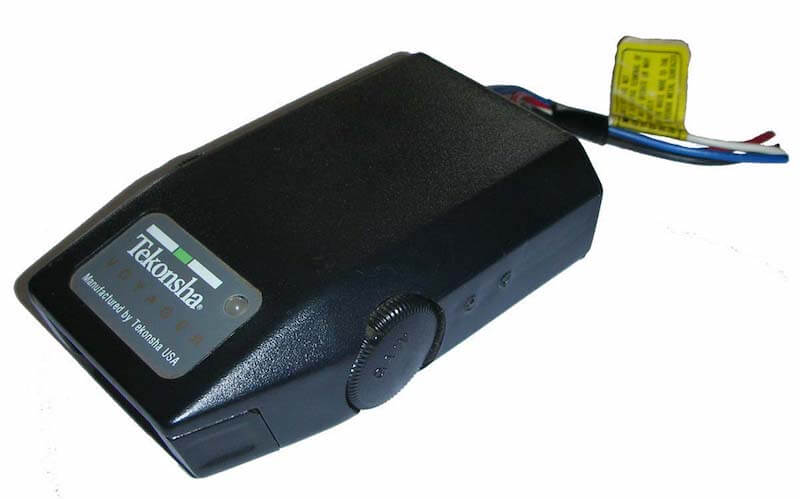Truck Brakes, Trailer Brakes and Breakaway Safety Systems
By: Leigh Goodison Grieve

Understanding which brakes are slowing down your trailer when you apply pressure to your truck’s brake pedal can be a bit of a mystery. With brakes on your truck, why should you need brakes on your trailer? But if you don’t have brakes on your trailer, having an additional 2500-5000 lbs pushing your truck makes it not only more difficult to stop, it increases wear on your truck’s brakes. That’s why having operating trailer brakes is essential.
Most new tandem (two) axle trailers have brakes on both front and rear axles. A lot of older trailers (pre- 1980’s) had brakes only on the rear axles. Single axle trailers (which are extremely dangerous for any use other than light utility hauling), don’t generally have any trailer brakes, and are not recommended.

When the trailer is plugged into the tow vehicle via the connector, the trailer receives power from the truck signaling the brakes to engage when the brakes are pressed. If the trailer is not receiving power because of a poor connection, the trailer brakes will not engage and you will be relying solely on the truck brakes to stop both truck and trailer.
Bad brake connections can be due to:
- An adapter diluting the signal being sent to the brakes
- Cord end is damaged or corroded inside
- Wiring is cut or damaged
- Worn out controller
The brake controller unit controlling the trailer brakes is mounted under the dash of the tow vehicle (unless the tow vehicle has a factory installed brake controller, an option on newer models). It is adjustable and needs to be set up so that the brakes neither come on too hard (which will cause the tires to freeze up and drag), or too little, so that you are basically relying on the truck brakes to slow. Brakes that are set up too high will prematurely wear out the brake pads, and create heat that wears out wheel bearings and other mechanisms.
There are two ways to connect a brake controller system to the truck:
- Direct plug-in is the ability to plug directly into the back of the brake controller and into the vehicles tow package via the fuse block.
- A traditional brake controller will have four wires extruding from the back and will need to be spliced into the electrical system.
The four basic styles of brake controllers:
- The timing activated brake controller
- The inertia activated brake controller
- The proportional activated brake
- The hydraulic over electric controls
Now that you understand the brakes on the trailer, there is one more ‘last ditch effort’ to brake the trailer should the trailer become detached from the tow vehicle. That is the breakaway brake system. The breakaway brake system requires a charged 12-volt battery to function. 12-volt batteries do not recharge themselves UNLESS you have a battery charger installed, which is essential, inexpensive and useful.
The cable to your brakes acts like an umbilical cord: it is the life support system of the trailer and the brake controller under your dash. But there is the possibility of the trailer ‘leaving its mother’ and coming off the hitch. Should this happen, the breakaway switch cable that is connected to a switch, pulls a pin that allows the battery to send voltage to the brake system and deploys the brakes at full capacity to stop the trailer. Once the breakaway system is deployed and you’re safely stopped, chock the trailer wheels as the battery charge will deplete and in most cases dissipate within half an hour, and the trailer will continue to roll. Remember, you will not have lights, so do not attempt to reconnect the trailer, instead set out reflective devices and wait for assistance.
While not all states require a trailer to have a breakaway system, many do, and not having them can result in severe fines. Even if not required, most new trailers are manufactured with them already in place. If your trailer is an older model and doesn’t have this system, have one installed. It only makes sense to have that extra measure of security in the case of an emergency.
Leigh Goodison Grieve is a freelance writer and editor, whose work has appeared in Western Horseman and Northwest Family Magazine among others. She is also co-owner of Horse Trailer Restoration, LLC, located in Battle Ground, WA, where she and her partner David Bodin restore, repair and maintain horse trailers. “The Secret Lives of Horse Trailers” will be released on DVD this summer. For more information visit www.handyrider.com.*
*This link was not active at the time this article was added to the website in 2019.
Published August 2011 Issue

The Colorado Horse Source is an independently owned and operated print and online magazine for horse owners and enthusiasts of all breeds and disciplines in Colorado and surrounding area. Our contemporary editorial columns are predominantly written by experts in the region, covering the care, training, keeping and enjoyment of horses, with an eye to the specific concerns in our region.

